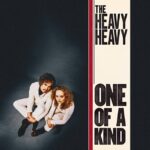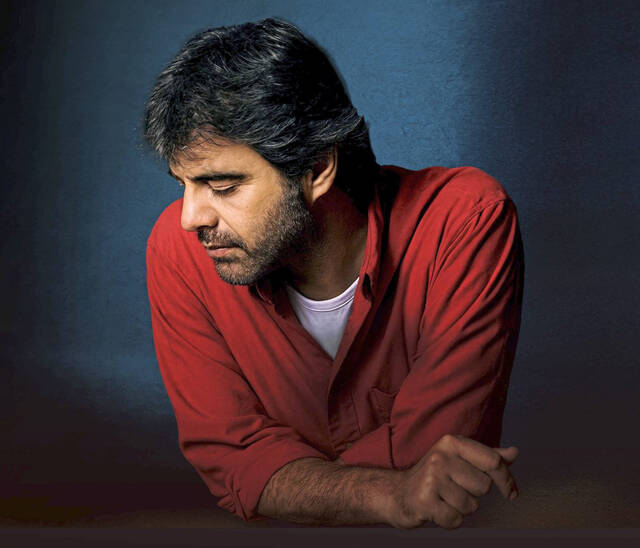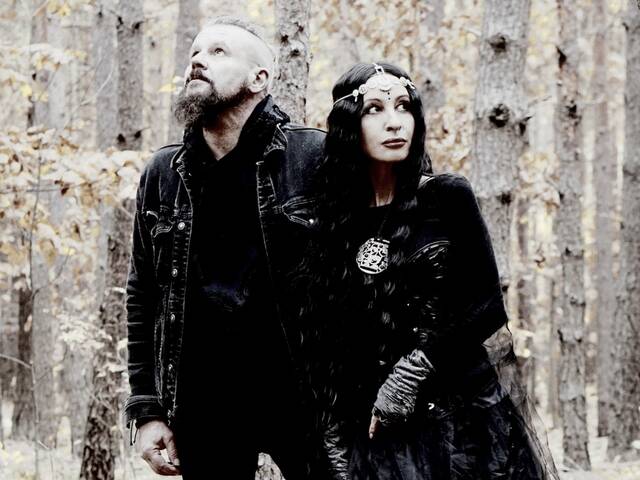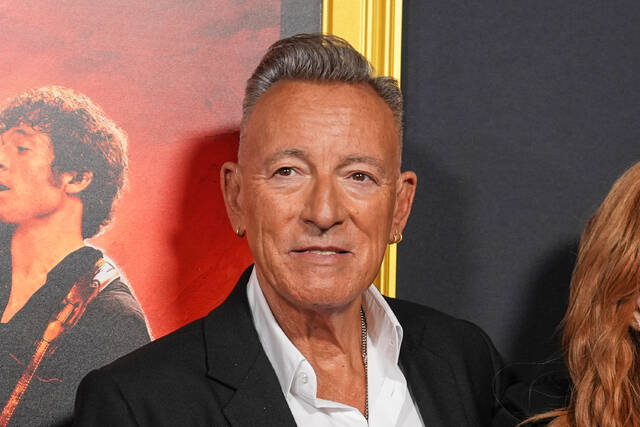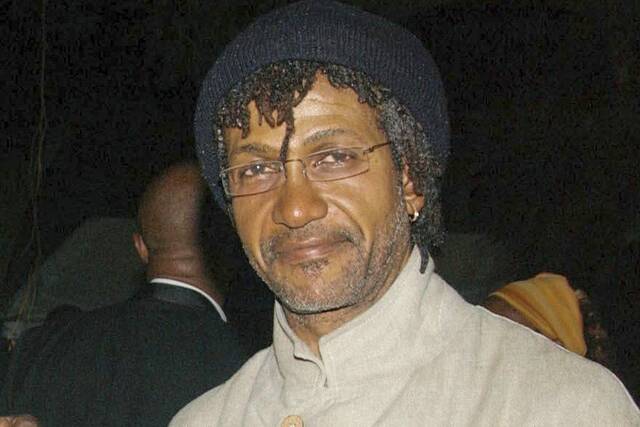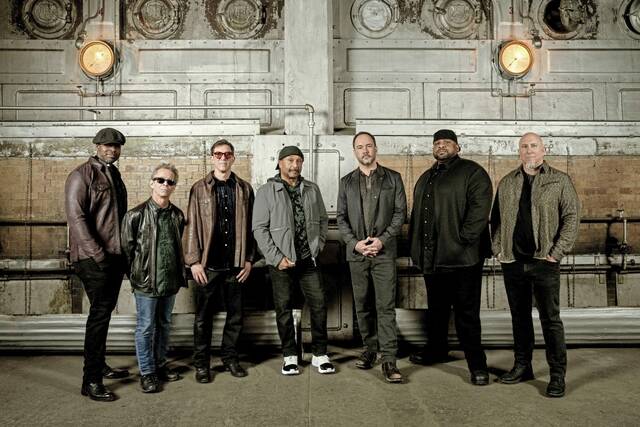On the day before The Heavy Heavy released their debut album earlier this month, singer Georgie Fuller ran into someone she hadn’t seen since March.
“They were like, ‘Is the album out?’ I was like, ‘Tomorrow!’ That’s so crazy. I’ve been talking about it for so long,” she said with a laugh.
The Heavy Heavy’s album, “One of a Kind,” has been in the works for a few years for the British band heavily inspired by vintage rock groups from the 1960s and ’70s. Their much-praised first EP, “Life and Life Only,” came out in 2020, with a re-release two years later.
The band, founded by William Turner and Fuller, sought a bigger sound for this album, expanding on the bright psychedelic pop/folk music of their EP with singles like “Happiness,” “Because You’re Mine” and “Feel.”
After a pair of shows in Pittsburgh last year, The Heavy Heavy will be back on Sept. 24 at Thunderbird Music Hall in Lawrenceville.
In a Zoom call earlier this month from Brighton, England, Turner and Fuller discussed the new album, their origins, touring and more in a conversation filled with completed thoughts and laughs.
(Interview edited for clarity and brevity)
Did you feel like this new album had a lot of expectations to live up to?
GF: Yeah, it was kind of weird in a way because the EP was so well received and has given us so much over the last two years. And it almost felt like this was a sophomore album even though we didn’t have an album out, in terms of some of the stresses that we felt making it, having two singles off the EP as AAA top fives, that’s quite a big thing to live up to with your debut album…
WT: In a way it was because we have the thing that those tracks that we put out before put us where we’re at. They took us from nothing to where we’re at, so we’d have to, in our minds, it was like we have to provide something that would do the same if we were discovered. So it did add some pressure, but at the end of the day, we’ve made so much music and recorded it, it’s just sort of the case of putting the best ones forward. We know we’re capable of doing it, but it was a slight amount of pressure.
GF: Yeah, for sure.
WT: I think that our heads were all over the place having been on tour for sort of two years, so we didn’t know if we were coming or going. We’re just sort of rolling with the rock ‘n’ roll machine, and we still are.
What do you feel like the biggest difference is between the songs on this album versus the music from the EP?
GF: The EP was a lot breezier, a lot more Laurel Canyon. This one, we were sort of like, OK, let’s just reclaim some of our British invasion roots here, making it a bit more bombastic, get some more power in there. And also having double the amount of songs to play with meant that we had double the amount of choice sonically. So that was cool, wasn’t it?
WT: Yeah. And we just wanted it to be a bit more bombastic, loud and proud. The EP was a sort of introduction, but this is us sort of really, really…
GF: Kicking the door down.
WT: Exactly that.
Did all of your touring and the live shows sort of help you develop what you wanted this (album) to be?
GF: There’s a song on the album called “Cherry,” and that original studio demo doesn’t have the sort of outro that we have now. And that was created during putting it on its feet and playing it so many times live and so, even just in terms of arrangement, doing the live shows helped shape some of these songs.
WT: I think that whilst we like to be like The Who in a way where it’s like the records are one thing and then the live show is a slightly different beast, so I think that we were after getting used to how it sounded live. I was like, well, it’d be good to have a little bit of that on the record, so that was an intention, yes.
GF: Because we’d only played six shows before we got signed, so we actually didn’t know what we sounded like live. So we’ve spent the last two years honing that and being like, oh, oh right, oh OK. (laughs)
How did the writing for this album go? Did it go pretty smoothly since you had a few years to work on this one?
WT: Yeah, it was good.
GF: There were two sticky songs, “Feel” and “Happiness.”
WT: Yeah, “Happiness” I was sort of really just despairing because I needed another song, and it was kind of very difficult to get one out at the very last moment. But I think on the whole, it was good. I look for very much a kind of world and an atmosphere to write into, and we’ve got lots of ones that didn’t make the album, and I think it’s so fun to make. It’s always just good, and it’s like you sort of analyze it at the end and be like, this is great, this is great, that’s kind of not quite there. … We had our backs against the wall to write another song just at the end. We felt that we did need a sort of a very bright, bit more concise thing we had to do. “Happiness” came out at the end. But other than that, it was good.
What was the issue with “Feel?”
GF: “Feel” started as some like groovy instrumental thing. And it took like six, seven, eight months to move away. Because once you get stuck in something…
And you love that so much, it’s hard to move away from it.
WT: I think it was the verse, wasn’t it? We had the chorus, but we didn’t know how to get there. And the riff was like, we need to stop being in that riff.
GF: We need to stop riffs!
WT: We can’t just have the riff for four minutes.
GF: And then lyrically as well, we’re phrasing melody, once we’d moved the song on instrumentally, we were like, wow, (expletive), what is the melody? And what is the phrasing? And what are we talking about here? But we just got a notebook out and started writing a whole load of (expletive) down, didn’t we?
WT: Yeah, and I remember going into the studio here and being like, putting some organ keys on it. … ‘Georgie, I’ve got it.’ I worked out how we’re gonna get away from the thing, but it was cool.
GF: Big sigh of relief in that moment.
WT: ‘Yeah, I think it’s OK.’ I can remember, that was December the 19th. I can remember that day.
When you have a song, or a piece of a song that you’re in love with, is it hard to put that to the side and be like, all right, this isn’t working?
WT: I think it comes to the very last moment … because you get so attached to it and you kind of wanna (keep it). They call it demo-itis, but you learn to enjoy it for what it is, but then to break away from it’s hard. And then at a certain point you get some perspective on it, which normally helps by going to a different song, a different section of songs and coming back and you’re like, actually, that isn’t gonna work. And maybe it’s useful somewhere else. I think that’s always quite cool when you have a bit that’s like a chorus or a verse or a bridge, and it doesn’t get used in one song. It doesn’t mean it’s dead. You can always bring it back.
GF: Five years later, you’re like, holy (expletive), that’s the chorus we need on this.
Going back to the start of the band, how did the two of you meet and start playing music together?
GF: I was working on someone’s album and they drafted Will in to produce it. And so we met like that, but that was like 10 years ago. And then we started doing some stuff together, like some dream pop-type stuff, which was just for fun. And then you asked me to record some backing vocals on your old band, like a more sort of surfy rock thing. And it was just the way Will produces and the range that my voice was in, we were like, there’s something here. But then it took another three, four years for The Heavy Heavy to come to fruition. So it’s been bubbling for a long time. But it’s only been five years.
WT: I don’t know.
GF: Something like that. Five.
WT: (laughs) We’ve lost all track of reality being on the road.
What makes this like a good musical partnership between the two of you?
GF: Because he does what I say.
WT: (laughs)
GF: Well, I think the fact that Will is from a production point of view, and I’m from a performance point of view, Will plays like all the instruments bar the drums. And I’m more about singing harmonies, vocals, the message. So I think really for the whole color palette of songwriting, we fill them all with various different sort of expertise.
WT: Yeah, I think we’re blessed that our voices mix together so well, let alone how we approach it. So it’s been fruitful in every direction really.
There’s been a lot of lofty praise sent your way, comparisons to Jefferson Airplane and The Mamas & the Papas. Is that something you pay attention to? Is that something that influences you?
GF: Very much so. I mean, it’s always the highest compliment because they’re our musical heroes and that’s who we grew up with and sort of felt moved by to start with. And so you’re almost like, well, we are not worthy, but we appreciate that you recognize something in us that we’ve taken from our greatest inspirations.
WT: I think for us, it’s a measure of success in a way to even be mentioned in the same breath is that we’ve done something good here, we’ve done something right, we’ve achieved what we want. We want to be part of that crowd in terms of sound and for making that sort of music. So if we can get anywhere near that, we’re very happy with it.
Related
• Seether bassist Dale Stewart on new album 'The Surface Seems So Far,' fatherhood and more ahead of Pittsburgh show• Interview: Victoria Canal talks new album 'Slowly, It Dawns,' flying in a helicopter with Tom Cruise and more
• 2024 Pittsburgh area concert calendar
I read that there was a shared ambition to make records that sound like your favorite records. What would some of those records be?
WT: I mean, how long have you got? “Deja Vu” by Crosby, Stills and Nash. I’ll put Doors’ “L.A. Woman.”
GF: The Duane Allman anthology is amazing. The Kozmic Blues, Janis Joplin and Big Brother and the Holding Company, like “Ball and Chain.”
WT: Yeah, certainly Creedence Clearwater Revival.
GF: Peter Green era Fleetwood Mac, but then also the Buckingham and Nicks version of Fleetwood Mac and the Fleetwood Mac in between those two, the “Bare Trees” era. “Sunny Side of Heaven” is one of my favorite tracks. Oh, there’s too many.
WT: We love so much of it.
GF: And then also modern stuff. Fleet Fox’s debut album is unbelievable.
WT: Early Black Keys albums.
GF: Tame Impala.
WT: Yeah, “Inner Speaker” by Tame Impala is amazing. And Kings of Leon, on even the first three, particularly the first two and then what the third album was, “Because of the Times,” I just love all that. Yeah, we could go on for a long time.
What about that other British band that just announced a reunion?
(Both laugh)
GF: I don’t know what you’re talking about, mate. Yeah, the ‘90s Brit rock.
WT: Stone Roses and stuff, but Stone Roses is a big influence of ours for something like “Miracle Sun” and “Feel” is kind of in that world.
GF: Just the Manchester scene and Blur. I was raised on Blur. And obviously Oasis.
Do you go back to old bands and study them to see what you can glean from them?
WT: I think that I listened to so much of it in my youth. I sort of grew up listening to it on little cassettes and headphones. I’m so familiar with the atmosphere of those records, the kind of feeling in the songs and how the performances were and how it sounds are so familiar to me that I can just call upon it when I could kind of recognize what sounds like that. And so I go straight for it. And there are certain points where I hear a sound. I’m like, I know exactly that sound from a certain record. It was a certain reverb or when I realized that you could put a guitar straight into a desk and straight into tape and hit the tape and have no guitar amplifier, I instantly thought this is what George Harrison’s guitar sound like on his solo albums. It’s not like we actually go and sit and listen to them and be like, analyze them, but I think we just know them through familiarity. And that’s why things will very much stick out if they’re not right, because it’ll be like, that’s just not, even chords, you do a chord, and it’s more Coldplay than it is Crosby, Stills and Nash, and it kind of instantly becomes kind of inaccessible. We can’t really do it because it doesn’t work with the sound we’ve got.
GF: And it’s the same vocally, like Janis. It was such an incredible era of vocal discovery because there really wasn’t like the techniques that singers have these days, the vocal hygiene and how to warm up and how to warm down and all of that stuff. And they were just going for it. I don’t know if Janis Joplin would have a voice now if she was still alive. Like Stevie Nicks was told in the ‘90s that if she didn’t stop singing the way she did, she wouldn’t have a voice in five years. So there’s something so raw on the way they laid down those vocal recordings. And the same goes with what you’re saying about the chords, the chord progression. It’s the same with the voices. There is so much more melisma and people are trilling left, right and center. The merit of a good singer these days is how many notes you can fit into a nanosecond. And actually, what about the timbre of someone’s voice? What about the way they phrase it? And that’s more what we’re looking for, isn’t it, when we’re putting a song together.
WT: There’s many ways to sing the same line, but certain things like that’s how they would have done it. And that is the kind of guiding principle, I think.
I know that you said that you don’t know whether you’re coming or going. So are you ready to get back out on the road pretty soon?
GF: Let’s go! … It’s always a funny thing because, at the end of a tour, you’re so run ragged that you want a few days where you can just stop, but then you miss it. …
Can’t I just have both at the same time? Could I just do what the (Rolling) Stones do where they do two cities a week and travel by private jet? Like that would be fine. (laughs)
WT: But we sort of stopped the last one and then sort of prepare for the next one. So it really is a never-ending train.
GF: Yeah, Will’s got, the floor right now is covered.
WT: I’ve got all my amplifiers out. Everything’s ready for this UK run. I’ve got new pedals and everything. It’s taken me all week, but no, it never ends.
GF: That’s the joy.
WT: It’s the rock ‘n’ roll dream. We’ve got it.





